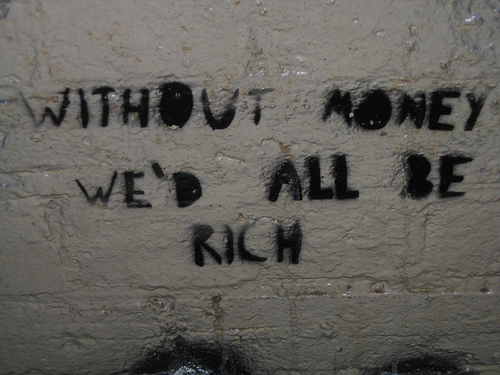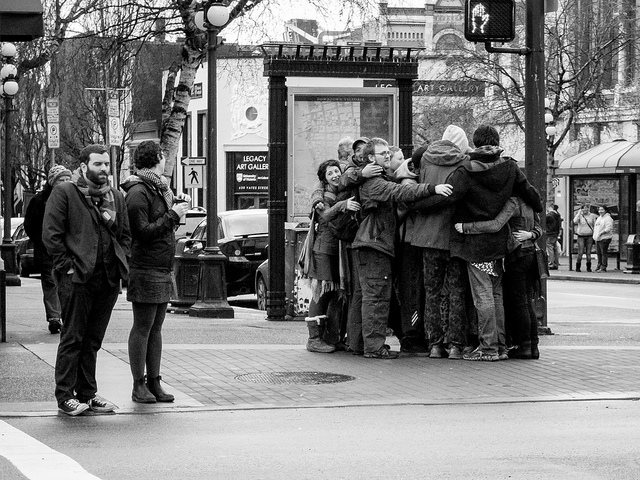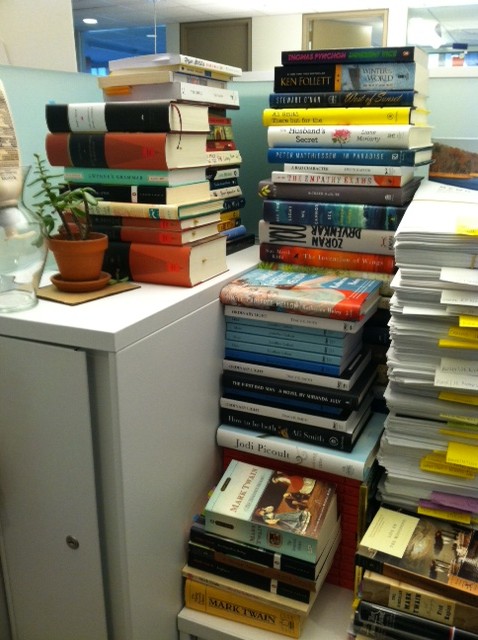 We all know that money can’t buy happiness–there’s ample statistical evidence as proof, even beyond the anecdotal stories of the miserable millionaires we meet or hear about in real life. But money does buy some things, many of which can certainly add to one’s qualitative happiness levels immediately and in the long-term. Worrying about money, or having an empty wallet, can likewise contribute to one’s overall unhappiness and sense of failure and disappointment. While you may not be actively looking for a new pair of shoes to get you out of the Monday slump, spotting a pair on your way home from work and not being able to get them will doubtless make Monday even less tolerable.
We all know that money can’t buy happiness–there’s ample statistical evidence as proof, even beyond the anecdotal stories of the miserable millionaires we meet or hear about in real life. But money does buy some things, many of which can certainly add to one’s qualitative happiness levels immediately and in the long-term. Worrying about money, or having an empty wallet, can likewise contribute to one’s overall unhappiness and sense of failure and disappointment. While you may not be actively looking for a new pair of shoes to get you out of the Monday slump, spotting a pair on your way home from work and not being able to get them will doubtless make Monday even less tolerable.
I’ve recently been hearing a lot about money woes from my friends and family alike. The hit our bank accounts took from the holidays was part of the reason, as is the fact that I work in a notoriously under-paid industry. But money problems can affect anyone at any time, and they usually come without warning. So what to do when you’re suddenly scrutinizing every penny you have and don’t have to the degree that it impacts your relationships and daily activities?
Keeping to a budget and knowing the resources required for resolving major financial problems are key tools for all of us to have in our life toolboxes; it’s particularly important for young women of the millennial generation, who are increasingly independent yet still (and stereotypically) struggle with financial planning. At the same time, turning your brain into an ATM machine is no way to “live” at all. Stepping back to consider other sources of wealth that lack a price tag will also make money problems seem less urgent, dour, and all-consuming. Here are some thoughts for moving your life accounting ledgers from the red to the black, even without additional cash flow.
1. Value the people in your life. Let’s say you just got bad news–you broke up with your partner, you got fired, etc. You go out and buy something new and shiny, and something sugary and tasty to ease the pain. Then you call your BFF and cry for an hour. What helped more, the things you bought or baring your soul to your friend? Probably the latter. We often underestimate how important our loved ones are because, well, they’re more or less always there. That stability and resource is not one to be taken for granted. Like a blank check, it can be drawn upon countless times and for any amount, and there’s rarely a supply-and-demand problem. Spending time with others is also completely free.
2. Value your body. An abundance of negativity about body image exists in the world, and entire industries are built upon people feeling bad about the way they look/eat/feel/exercise. Even if you are slightly out of shape or struggle with body issues, the sheer miracle of the human body is one to place a high value on. Think about all that your body does for you without your even trying: the automatic systems that fuel your brain, heart, lungs, muscles, cells . . . all those things. Then think about everything you tell it to do, and that you’re able to teach it to do so many things–from babies learning to walk to adults mastering insane yoga poses, climbing mountains, and running marathons. Then there’s the extraordinary stories of adrenaline-induced rescues–moms saving their children from being crushed by cars. You may not always be aware of the amazingness that is the physical YOU, and that’s nothing to take for granted.

You may not be able to do this yet . . . but you’re capable of it! Treat your body like the temple and pillar of strength it is.
3. Value sentiments. There’s a reason that we hang onto things for “sentimental value”–it’s real! While tossing things because they’re merely “sentimental” is perhaps a quick and logical approach to decluttering your life or home, or making room for something else, it also puts disproportionate value on items and space themselves rather than our reasons for having them. I would check myself into Book Hoarders Anonymous any day of the week, because my apartment, my cubicle, and my old room at my parents’ house are all filled with books–literally piled in every corner, on every shelf, even used for decorative purposes. I have these things because books are a life-source for me: I feel good having them around. They may not be worth much monetarily, but when I look at my worn-out copy of Wuthering Heights and remember that stormy night in college when I first read it, the elation I felt when I got the first (and only) A+ on the paper I wrote for it, and the countless meaningful conversations I had with others about it, I know I’d never be able to get rid of it–even if you paid me to. Finding things like this in your life, whether they’re tangible or not, and surrounding yourself with them can make you realize all that you already have to fulfill many of your needs. And when the time comes to choose between buying something new for the heck of it and trading something else in exchange, you’ll know what is worth the swap and what isn’t.
What makes you feel rich in life? Please share the wealth!
Related: 5 Ways to Have More Joie de Vivre
7 Financial Tips You Can’t Afford to Not Follow
Also by Jennifer: Redefining “Relaxing” and Personalizing Your You-Time
Photos: Flickr Commons; Jennifer Kurdyla






